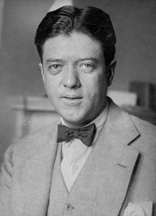Robert M. La Follette Jr.
Robert M. La Follette, Jr. | |
|---|---|
 | |
| United States Senator from Wisconsin | |
| In office September 30, 1925 – January 3, 1947 | |
| Preceded by | Robert M. La Follette, Sr. |
| Succeeded by | Joseph McCarthy |
| Personal details | |
| Nationality | American |
| Political party | Republican Wisconsin Progressive Party |
| Spouse | Rachel Wilson Young |
Robert Marion "Young Bob" La Follette, Jr. (February 6, 1895 – February 24, 1953) was an American senator from Wisconsin from 1925 to 1947, the son of Robert M. La Follette, Sr., the brother of Philip La Follette, and Fola La Follette, whose husband was the playwright George Middleton.
Biography
Early life
La Follette was born in. Madison, Wisconsin. He attended the University of Wisconsin–Madison from 1913 to 1917, but did not graduate due to an illness (he received an Honorary LLD from Univ. of Wisconsin in 1938). This same illness prevented him from serving in the military during World War I. He served as private secretary to his father between 1919 and 1925. He married Rachel Wilson Young in 1930, and they had two sons, Joseph Oden and Bronson Cutting.
Political career
La Follette was elected as a Republican to the United States Senate on September 29, 1925, to fill the vacancy caused by the death of his father. "Young Bob," as he was called, was a champion of organized labor. He gained national prominence between 1936 and 1940 as chairman of a special Senate investigating committee, commonly called the La Follette Civil Liberties Committee, which exposed the surveillance, physical intimidation and other techniques used by large employers to prevent workers from organizing.
He was chairman of the Committee on Manufactures in the 71st and 72nd Congresses. He supported President Franklin D. Roosevelt and most New Deal legislation until the passage of the 1938 naval expansion bill.
He was re-elected as a Republican in 1928. With his brother Philip, he formed the Wisconsin Progressive Party in 1934, and for a time the party was dominant in Wisconsin. He was reelected with the Wisconsin Progressive Party in 1934 and 1940. The Progressives later dissolved, and La Follette returned to the Republican Party in 1946. La Follette was considered the Senate's leading isolationist and helped found the America First Committee. He helped to draft and win passage of the Legislative Reorganization Act of 1946, which modernized the legislative process in Congress.[1]
La Follette was an unsuccessful candidate for reelection as a Republican in 1946. He ran a conservative campaign against the United Nations and was critical of Stalin, but ended up losing to Joseph McCarthy in the Republican primary by about 5000 votes.[2] After the election La Follette claimed that Communists in the labor unions had contributed to his defeat.
Later life and suicide
After his defeat by McCarthy, La Follette was a foreign aid advisor to the Truman administration.
In a February 8, 1947 Collier's Weekly article, La Follette reported his experience with infiltration of Communists onto Congressional Committee staffs. The Venona project materials revealed four agents of Soviet intelligence who had served on his Civil Liberties Subcommittee, including the Chief Counsel, John Abt.
On February 24, 1953, La Follette was found dead of a self-inflicted gunshot wound in Washington, D.C. On September 9, 1953, John Lautner testified before McCarthy's Permanent Subcommittee on Investigations, and revealed he knew of Communists who had served on La Follette's subcommittee. Some historians believe that La Follette killed himself out of fear of being called by McCarthy; others believe he succumbed to anxiety and depression, which plagued him for much of his life.[3].
He was interred at Forest Hill Cemetery in Madison, Wisconsin,[4] and was survived by his son, Bronson La Follette, who served as Wisconsin's attorney general from 1965 to 1969, and from 1975 to 1987.[5]
Awards and honors
The University of Wisconsin awarded La Follette an honorary LL.D. degree in 1938. He also received Collier's Magazine award for outstanding public service in 1946.
Footnotes
- ^ Welcome to The American Presidency
- ^ La Follette, Robert Marion, Jr., 1895 - 1953
- ^ JS Online: La Follette suicide linked to fear of McCarthy
- ^ The Political Graveyard: Index to Politicians: Ladendorf to Lair
- ^ "La Follette Death Ends Era in West. Hope for Progressive Comeback Diminishes. Party Once Was Supreme Power in State". New York Times. February 26, 1953, Thursday. Retrieved 2008-03-22.
The death of former Senator Robert M. La Follette Jr., who killed himself at his home in Washington yesterday, is not expected to have any considerable impact on the Wisconsin political situation, even though many of his followers in the old Progressive movement never abandoned hope that he would someday attempt a political comeback.
{{cite news}}: Check date values in:|date=(help); Cite has empty unknown parameter:|coauthors=(help)
External links
- United States Congress. "Robert M. La Follette Jr. (id: L000005)". Biographical Directory of the United States Congress.
- Robert M. La Follette, Jr., Dictionary of Wisconsin History, Wisconsin State Historical Society
- "La Follette suicide linked to fear of McCarthy" May 17, 2003 Milwaukee Journal-Sentinel
- Matusow, Harvey "The FBI, and the Justice Department: Becoming a Government Informer-witness in the McCarthy Era"
- La Follette at the Dictionary of Wisconsin History
- Maney, Patrick, "Joe McCarthy's First Victim", Virginia Quarterly Review, Summer 2001
- Youngs, William, American Realities, Sixth Edition Volume 2, Eastern Washington University, 2006.
- 1895 births
- 1953 deaths
- American progressives
- Suicides by firearm in Washington, D.C.
- People from Madison, Wisconsin
- American politicians who committed suicide
- United States Senators from Wisconsin
- United States Senators of a third party
- American people of French descent
- Wisconsin Progressives
- University of Wisconsin–Madison alumni

